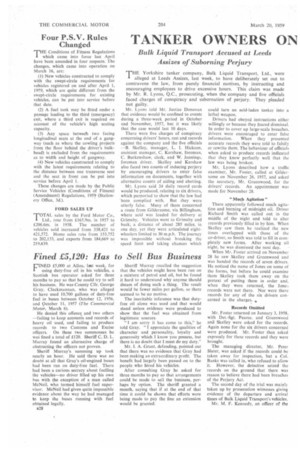TANKER OWNERS ON
Page 34

If you've noticed an error in this article please click here to report it so we can fix it.
Bulk Liquid Transport Accused at Leeds Assizes of Suborning Perjury
THE Yorkshire tanker company, Bulk Liquid Transport, Ltd., were alleged at Leeds Assizes, last week, to have deliberately set out to contravene the law, from purely financial motives, by instructing and
encouraging employees to drive excessive hours. This claim was made by Mr. R. Lyons, Q.C., prosecuting, when the company and five officials faced charges of conspiracy and subornation of perjury. They pleaded not guilty.
Mr. Lyons told Mr. Justice Donovan that evidence would be confined to events during a three-week period in October and November, 1957, but it was likely that the case would last 10 days.
There were five charges of conspiracy concerning drivers' hours, rest and records against the company and the five officials --B. Skelley, manager, L. I. Hickson, assistant manager, C. Kershaw, foreman, C. Burkenshaw, clerk, and W. Jennings, foreman driver. Skelley and Kershaw also faced two counts of inducing perjury by encouraging drivers to enter false information on documents, together with alternative counts of aiding and abetting.
Mr. Lyons said 24 daily record cards would be produced, relating to six drivers, which purported to show that the taw had been complied with. But they were utterly False. Many of them concerned a route from Gildersome, via 13illingham, where acid was loaded for delivery at Grimsby. Vehicles went to Grimsby and back, a distance of about 285 miles, in one day, yet they were articulated eightwheelers limited to 30 m.p.h. The journey was impossible without breaking the speed limit and taking chances which could turn an acid-laden tanker into a lethal weapon.
Drivers had obeyed instructions either willingly or because they feared dismissal. In order to cover up large-scale breaches, drivers were encouraged to enter false information_ When they presented accurate records they were told to falsify or rewrite them. The behaviour of officials when asked to produce records indicated that they knew perfectly well that the law was being broken.
Mr. Lyons described how a traffic examiner, Mr. Foster, called at Gildersome on November 26, 1957, and asked the secretary, Mr. Greenwood, for the drivers' records. An appointment was made for November 28.
"Much Agitation" There apparently followed much agitation and burning of midnight oil. Driver Richard Smith was called out in the middle of the night and told to alter records previously filled in by him. When Skelley saw them he realized the new times overlapped with those of the co-driver, so Smith was told to fill in completely new forms. After working all night, he was dismissed the next day.
When Mr. Foster arrived on November 28 he saw Skelley and Greenwood and was handed the records of seven drivers. He noticed the name of Jones on some of the forms, but before he could examine them Skelley took them away on the pretext of putting them in order and. when they were returned, the Jones records were not there. Nor were there records for any of the six drivers concerned in the charges_ ,, Records Omitted Mr. Foster returned on January 3, 1958, with Det.-Sgt. Pearce. and Greenwood arta Skelley were asked for the records. Again none for the six drivers concerned were produced. Mr. Foster then asked expressly for these records and they were brought.
The managing director, Mr. Peter Slater, was asked if the records could -be taken away for inspection, but a Col. Banks was called in, who refused to allow it. However, the defective seized the records on the ground that there was reason to believe there had been breaches of the Perjury Act.
The second day of the trial was mainly taken up by prosecution witnesses giving evidence of the departure and arrival times of Bulk Liquid Transport's vehicles, Mr. M. F. Kennedy, an officer of the












































































































